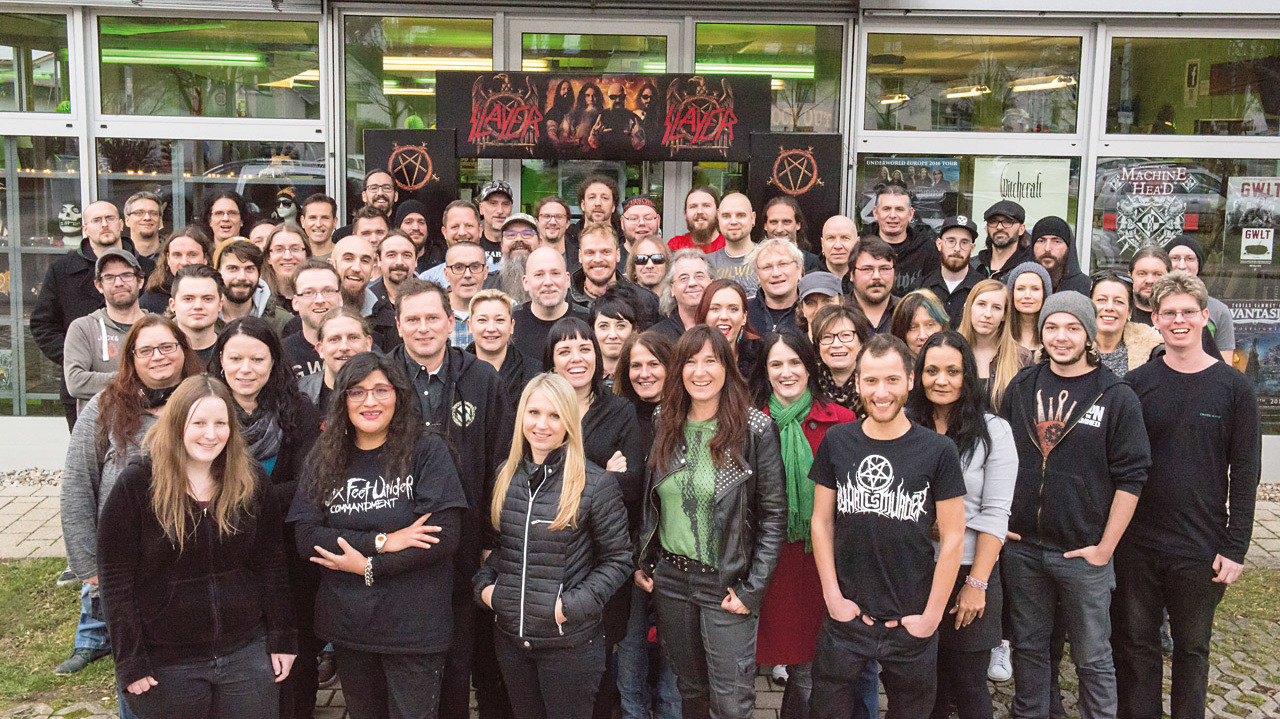There are many excellent places to watch a thunderstorm break on the horizon, but 50 feet off the ground in a steel gantry at a Bavarian metal festival isn’t one of them. In any other situation, the cracking thunder, forked lightning and sheets of biblical rain heading towards us would be an impressive spectacle. Right now, the threat of imminent death by electrocution or drowning is putting a bit of a dampener on the situation.
Still, it’s a fitting backdrop to today’s entertainment. The Friday of the Summer Breeze festival has been rechristened the Blast Bash to mark the 30th anniversary of powerhouse German label Nuclear Blast. The whole of the main stage bill is given over entirely to NB bands, from Battle Beast, Hatebreed and Epica to Children Of Bodom and Teutonic thrash icons Kreator. The storm heading our way has got nothing on the one that’s been happening onstage all day.
At ground level, a 49-year-old blond-haired man is watching everything unfold with a quiet pride. This is Markus Staiger, the man who founded Nuclear Blast 30 years ago in the small town of Donzdorf and has successfully steered it through the sort of choppy waters that have holed so many other labels. Like the rest of the 40,000-strong Summer Breeze crowd, Markus is a huge music fan. What separates him is that he happens to run one of the most successful metal labels in history. One that started out as a strictly DIY operation run from his parents’ house to put out records by US death, grind and hardcore bands has branched out in unimaginable ways, musically and commercially. Today, 30 years after he started it, Nuclear Blast is one of metal’s biggest players.
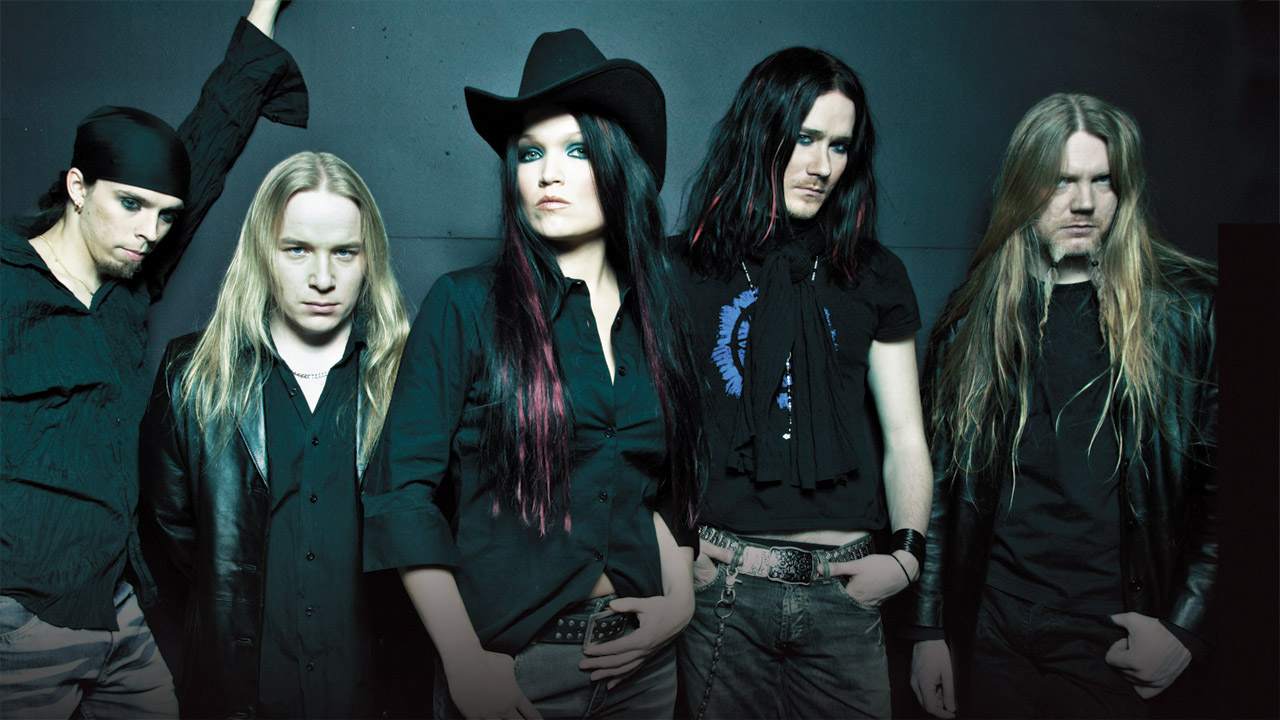
“I listened to Slayer when I was 15 years old – I didn’t know then that I would start a label, let alone that they would be on it,” says Markus. “The same with Kreator and Testament and Exodus. That’s fucking extraordinary. It makes me very happy.” Nuclear Blast was far from the first independent label to emerge from the primal soup of the 1980s underground metal scene. The likes of Roadrunner, Metal Blade, Music For Nations, Megaforce and Earache were all already home to a battalion of influential (and some not-so-influential) bands who couldn’t get a look-in on major labels.
Markus had set up a mail order company to sell his favourite bands’ albums. But he wanted to take it to another level. And so, at the age of 21, armed with 7,000 German Marks (roughly £3,300), he founded Nuclear Blast, its name partly inspired by US hardcore band Bl’ast. “I first knew Markus before he set up Nuclear Blast,” says Kreator singer Mille Petrozza, whose band signed to the label in 2010. “He was a tape trader. He was super-passionate about music even back then.”
The first album to be released on Nuclear Blast was Senseless Death, a compilation of US hardcore and crossover bands including Attitude, Dehumanizers and Sacred Denial (the album’s cover was designed by Markus’s brother-in-law). It was followed in short order by Condemned’s Humanoid Or Biomechanoid and Impulse Manslaughter’s debut album.
The early years were hard. Markus would work through the night in his parents’ house, speaking to bands and packaging up albums to be mailed out. There were cashflow problems – at one point he even handed over the papers for his car as security. “You sell some records, you get some money, you sign bigger bands, you need more money for bigger advances,” says Markus. “It took me about seven or eight years until my bank account was back at zero.” The financial high-wire act was worth it. Nuclear Blast began to establish itself as a force to be reckoned with on the underground scene, thanks to a roster that included the likes of Benediction (featuring future Napalm Death vocalist Barney Greenway), New Orleans thrashers Incubus (not to be confused with the nu metal band of the same name) and Chicago death metal heavyweights Master.
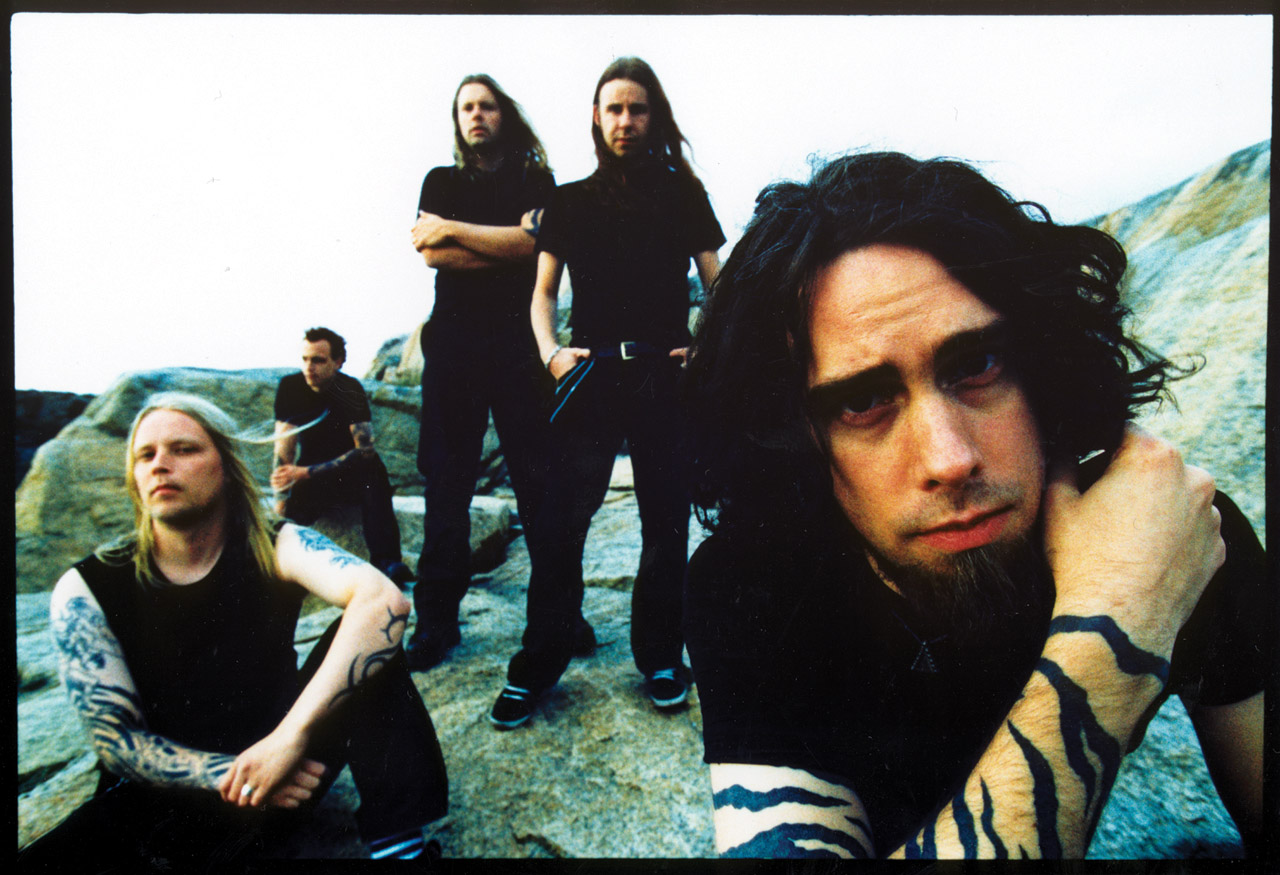
One key early signing was a bunch of greenhorn Swedish thrashers named Meshuggah, whose debut album, Contradictions Collapse, was released in 1991 (catalogue number NB409). Another was fellow Swedes Hypocrisy, whose own debut, Penetralia, emerged the following year. “I wasn’t aware of Nuclear Blast until we started looking to get a label,” says Hypocrisy frontman Peter Tägtgren. “We sent our music to everyone and Nuclear Blast was the only one that answered back, two days after we sent it. We were an unknown band, so we only got a very small budget to record the album. But no one else would give us a chance.”
With their most notable contemporary, Roadrunner, outgrowing its own death metal and hardcore roots, Markus spotted a gap in the market. Over the next few years, he bulked out the NB roster with quality extreme metal. “All the bands that I liked when I was young were on Nuclear Blast, like Amorphis,” says Mark Jansen of Dutch symphonic metallers Epica, who’ve been with NB since the late 00s. “But I didn’t recognise a sound, more like an attitude. You didn’t get that anywhere else.” A turning point came in 1997 when the label released pivotal albums by two radically different bands: Glory To The Brave by power metal kingpins Hammerfall and Dimmu Borgir’s symphonic Enthrone Darkness Triumphant. Suddenly, Nuclear Blast had transcended its roots as an extreme metal label. The flipside is that it was perceived as a distinctly German proposition peddling a uniquely – some might say cheesy – strain of Middle- European metal.
“I’m not sure that’s accurate,” argues Hatebreed’s Jamey Jasta, whose band signed to NB worldwide for their 2016 album The Concrete Confessional. “I had a Meshuggah Destroy Erase Improve poster on my bedroom wall next to Slash and Axl and Ozzy and Randy. I actually think it really came into its own in America way before people think it did.”
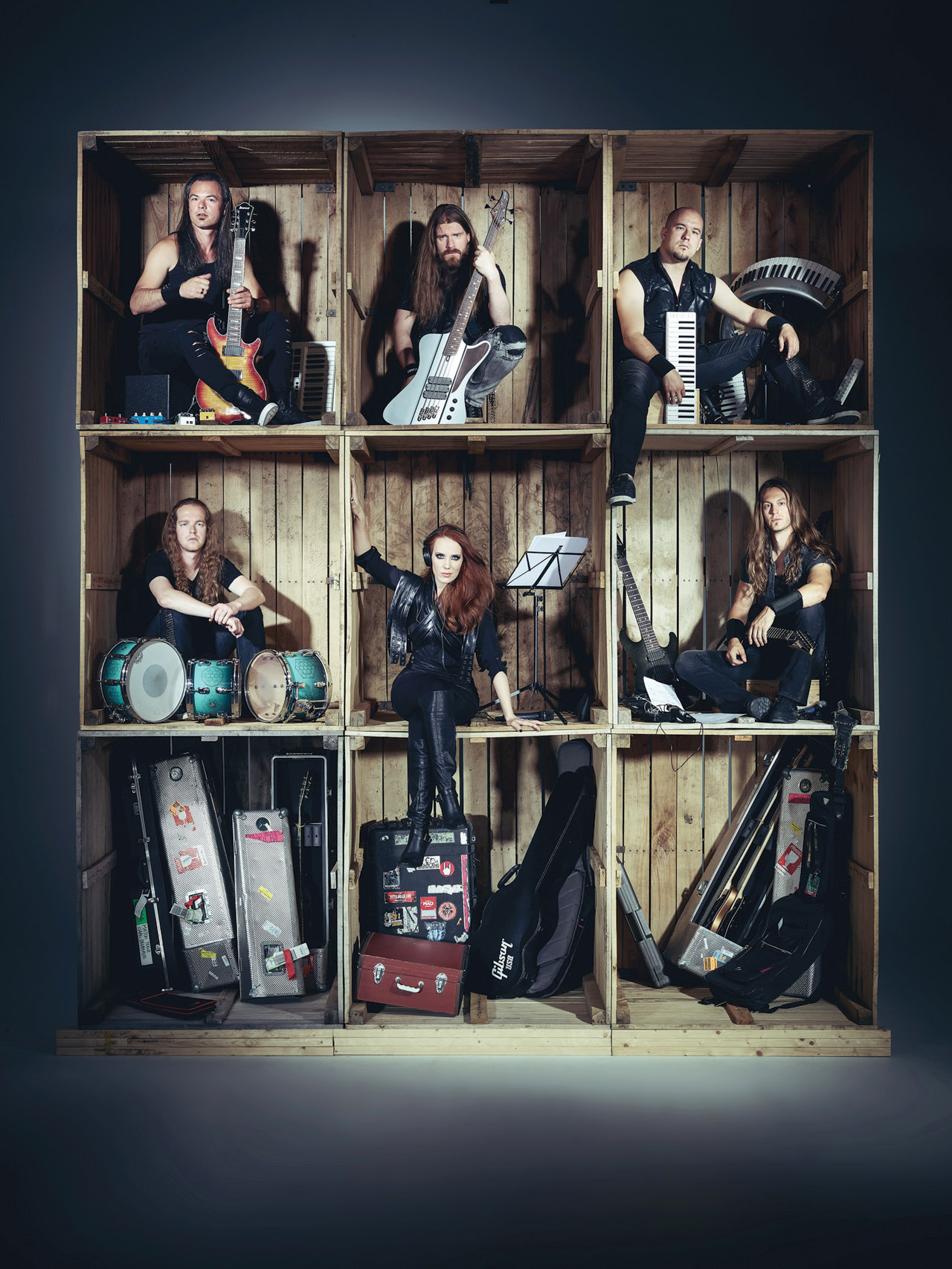
The last two decades have been a boom time for Nuclear Blast. Its successes are etched in company lore: Meshuggah’s Nothing (the first NB album to crack the US Top 200 in 2002); Nightwish’s Once (the label’s best-selling album when it was released in 2004, a record it still holds today); Slayer’s Repentless (reached Number 4 in the US in 2015, the highest-charting Stateside album). There are other, less tangible triumphs – not least the unexpected resurrection of the moribund thrash genre courtesy of acclaimed albums from the likes of Exodus, Testament, Kreator, Overkill and more.
“One of my proudest moments was basically telling the world in 2003 that Exodus were super-relevant,” says Gerardo Martinez, general manager of Nuclear Blast’s US wing. “You gotta remember that no one gave a flying eff about thrash bands. Then there’s a band like Dimmu Borgir, who were on the Hellboy trailer – that was some achievement.”
Inevitably, there have been plenty of failures, too. Gerardo names Virginia death metallers Arsis as one of the label’s biggest disappointments. “They had so much potential but they basically self-destructed,” he says. Similarly, there have been those bands who slipped through the net; Gerardo says current NB mainstays Lamb Of God received knockbacks from the label early in their career.
But perhaps the biggest reflection of Nuclear Blast’s success is its continued existence. Where many of its original peers have either gone under or been subsumed into major labels, NB hasn’t just survived, it has prospered. The demise of Roadrunner in its original independent form undoubtedly helped strengthen Nuclear Blast’s position in the market, though Gerardo denies that it has all been positive. “If anything, it was bad for the scene,” he says. “The less independent labels that are out there, the harder it is for bands to get their music out there. Sure, we were able to get bands out of that explosion, like Fear Factory or Machine Head. But we were already really established by that point.”
But then the German label is different to many of its current and former contemporaries, in that it has no distinct musical identity. Or rather it has many: death metal sits next to metalcore, symphonic metal bands rub shoulders with dyed-in-the-wool hardcore, retro-rock shares oxygen with doom metal.
- Slayer, Anthrax and more in Nuclear Blast anniversary box set
- Inside the mind of Tomas Haake, Meshuggah's modern musical genius
- In Flames: "This music and genre will last forever"
- Epica headline the first Metal Hammer tour of 2018
As the worst of the storm passes just off to our left at Summer Breeze, leaving the crowd drenched but thankfully not electrocuted, Markus Staiger continues to be the centre of everyone’s offstage attention. “I like his passion,” says Jamey Jasta. “Anybody who knows the old bands, the Exploiteds, the Agnostic Fronts, the Discharges, but then is telling me about fucking Suicide Silence and We Came As Romans with the same fervour and enthusiasm is a real music guy.”
This much is true. A few hours earlier, Hammer bumped into Marcus at our shared hotel. Before introductions had been properly made, he was already playing a song on his iPhone by new US band Sink The Ship, one of the latest signings to Sharptone, an NB offshoot label that focuses on rock and alternative music (another subsidiary label, Arising Empire, is home to up-and-coming metalcore and punk bands).
“It was important to open the label to all subgenres,” says Markus. “After the death metal boom, it was important to have bands like Hammerfall or Primal Fear. Today, on the one hand you have Meshuggah, on the other you have a band like Threshold and on the other you have Sink The Ship. I love every second of it all.” That, as much as anything, is the secret of Nuclear Blast’s success: like all the best labels, NB is run by the fans for the fans. Metal needs its mavericks and its maverick labels. “It goes against the grain,” says Epica’s Mark Jansen. “Every time I come in their office, everybody’s listening to metal. That’s what I want. I don’t want to be with a label where everyone’s thinking about money and profit.”
The 30 Years of Nuclear Blast anniversary compilation DVD+4CD is out now, featuring bands such as Nightwish, Mershuggah and Cradle of Filth. Epica play a Hammer-sponsored tour next April.
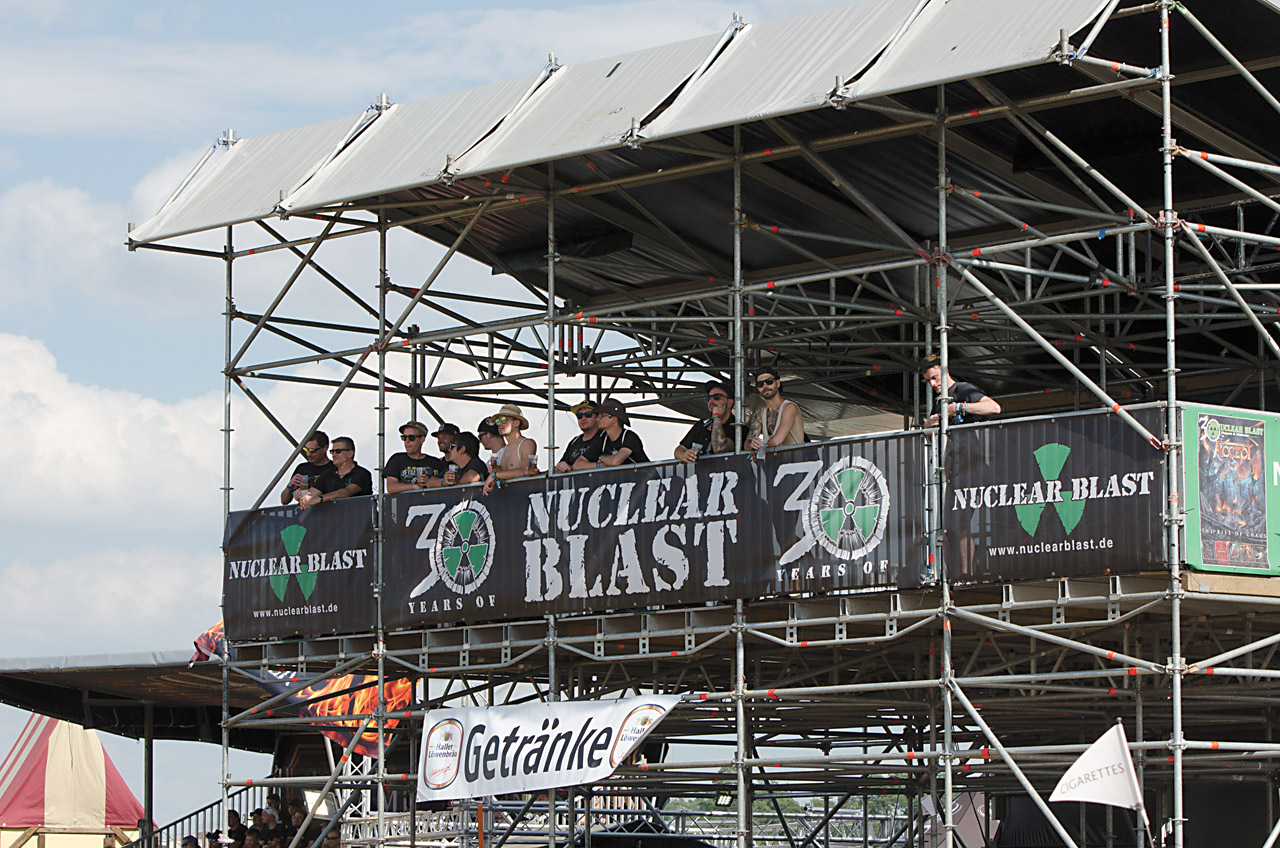
A brief history of the last three decades of heavy
1987: Markus Staiger founds Nuclear Blast in his hometown of Donzdorf. The first record released on the label is the compilation _Senseless Deat_h.
1990: Albums by death metal bands Atrocity, Master and Incubus sell more than 30,000 copies each.
1991: Meshuggah’s debut album, Contradictions Collapse, is released. The band remain on Nuclear Blast to this day.
1995: Gorefest’s Erase becomes the first Nuclear Blast album to enter the German charts, reaching Number 82.
1996: In Flames’ breakthrough second album, The Jester Race, is released.
1997: Hammerfall become the label’s first power metal success story when their debut album, Glory To The Brave, reaches the German Top 40.
2002: Meshuggah become the first Nuclear Blast band to break into the US Top 200, when Nothing reaches Number 165.
2004: Nightwish’s Once becomes the biggest-selling album released by Nuclear Blast. Dimmu Borgir become the first black metal band to play on the US Ozzfest tour, helping to properly establish the label as a force on the US metal scene.
2008: Testament release their acclaimed comeback album, The Formation Of Damnation, adding weight to a thrash revival that also includes NB labelmates Exodus, Overkill and Death Angel.
2012: Nuclear Blast recruit several former executives from the recently downsized Roadrunner Records, including A&R guru Monte Conner and UK MD Mark Palmer.
2013: The label dips its toes into the world of retro rock with Devil Man, the second EP from Swedish psych-rockers Blues Pills.
2014: Nuclear Blast release Suicide Silence’s You Can’t Stop Me – the first album since the death of frontman Mitch Lucker.
2015: Slayer’s Repentless debuts at Number 4 in the Billboard Chart – Nuclear Blast’s highest charting album in the US.
2016: Offshoot Sharptone Records is launched as a home for rock and alternative music. Its roster includes Miss May I, Don Broco and Emmure.
2017: Nuclear Blast celebrates its 30th birthday.
